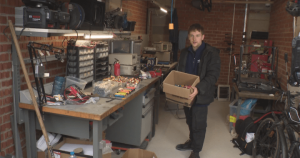The wild inside story of Donald Trump biopic The Apprentice
When Gabriel Sherman embarked on dramatising the life of Donald Trump, he knew he was in for a bumpy ride. And so it proved. Writing the screenplay for The Apprentice, which chronicles Trump’s ascent during the 1970s and ’80s under the tutelage of unscrupulous attorney Roy Cohn, turned out to be the relatively easy part. Financing the film proved more difficult. Enter an unlikely hero: billionaire Trump megadonor Dan Snyder via his son-in-law’s production company, Kinematics. Casting brought further boons: rising star Sebastian Stan took the role of young Donald, Succession’s Jeremy Strong slipped into the reptilian skin of Cohn, Maria Bakalova draped herself in furs and jewels to play Ivana Trump.
But the rest was not smooth sailing: Snyder had a violent change of heart, then came legal threats from Trump’s own lawyers. Now, with the clock ticking down to the November 5 election, the film is due to arrive in US cinemas this week.
RA: The Apprentice takes place between 1973 and 1986. Why did you choose that period?
GS: When I came up with the idea for the film, I was a political journalist covering Trump’s 2016 presidential campaign. One of the things that people who had known him since the 1980s, like Roger Stone, would tell me is: he’s winning because he’s using the lessons that Roy Cohn taught him. Then, early into the Trump presidency . . . it came to me: Donald is using Roy’s lessons, Roy created Donald — that’s the movie. That will explain this current reality we’re living in. That’s why I decided to focus on those years, because Donald met Roy in 1973, and the movie ends with Roy’s death in 1986.
And what do you think that time period tells us about him?
One of the building blocks of drama is change, and I think this is the period of Donald Trump’s life in which he underwent the most fundamental change. He started as the middle son of a middle-class housing developer in Queens, living in a fairly modest upper Manhattan bachelor-pad apartment. He was a nobody trying to become somebody. And over these 13 years, he meets Roy Cohn, develops his first major property, meets his [first] wife, develops Trump Tower, then expands into casinos. He’s undergoing incredibly rapid change. And by the end of the movie, he’s become the person we see today. I would argue that Donald Trump post-1980s really did not change at all. He’s basically the same person that he was then.


Some observers have questioned whether everything in the film is strictly factual. How much artistic licence did you use?
What I would say is that the film is rigorously researched. I did as much research and reporting to write this screenplay as I have done for any journalism I’ve done. That said, it is a work of art. It’s not a documentary. It’s not journalism. It’s based on real events and every major turning point in the movie is documented by real events.
A scene showing Trump sexually assaulting Ivana has already proved controversial. Why did you choose to include it?
That scene is based on her 1990 divorce deposition, which she made under oath. She testified during the deposition that this assault had taken place. Subsequently, in 1993, there was a book about Trump coming out that was going to report these revelations. Trump’s lawyers pressured the publisher of The Lost Tycoon to amend her statement to clarify that she didn’t mean it was criminal. And then, when Trump ran for president, 25 years later, she issued another statement [saying “The story is totally without merit”].
As a journalist, I would include all of these subsequent disclaimers and clarifications. But as a screenwriter, I look at the body of evidence and I ask myself: what feels the most emotionally true? . . . Her first version of events feels, to me, the most true to Donald’s character, and that’s the version I dramatised in the film. I felt it was important to include that scene because Trump has been credibly accused of sexual assault by more than a dozen women. He’s denied it, but this is out in public as an [alleged] aspect of his character. And so I felt it wouldn’t be an honest movie if it didn’t engage with that.
You must have known you were opening yourself up to accusations of fake news, even though this is a movie, not journalism?
Of course. I’ve written about him on and off for 20 years. My first job in journalism, right after 9/11, was covering Manhattan real estate. So of course I knew he would deny and say: this is fake. He’s entitled to do that, but I wanted to tell the story that I felt was the truest.
Have you met Donald Trump?
Many times, yeah. I met him when I was 23 years old. I covered his campaign in 2016, I spent time with him at Trump Tower, I visited Mar-a-Lago. I know his daughter Ivanka. One of the reasons I wanted to write this movie is that these people are characters in my life. They’re people that I’ve been around and I’ve thought about, so I felt like I could accurately describe them in a film.


What were your interactions with him like?
I was interviewing him, so they were journalistic — and they were interesting. One of the things liberals don’t fully grasp about Trump is that there is a side to him that is charming and funny — he has a razor-sharp sense of humour. He’s one of the only billionaires I’ve spent time with who will go off the record and gossip with you, want to know what you’re hearing and basically treat you as an equal. The dirty secret is that, as much as he calls the news media fake news, he loves spending time with journalists. Or at least that was my impression. So I could see how people would be seduced by him and I tried to capture some of that. And Sebastian Stan is so naturally charming that even as he starts to do despicable things, there’s still a part of you that can’t help but like him.
How did Dan Snyder come to bankroll the film?
This was not an easy movie to finance. No Hollywood studio wanted to produce it, so we knew we would have to raise money independently . . . When Ali Abbasi [the film’s director] was in Cannes in 2022, he met Mark Rapaport, a young producer who loved the script. Mark had launched a film production company called Kinematics that was financed by his father-in-law, Dan Snyder. We had asked Mark prior to production: are you sure your father-in-law is on board with this? And Mark assured us that, as long as the movie was down the middle of this very human portrait, he was fine with it. Obviously, we were nervous that Snyder’s money might be a conflict but, at the end of the day, no one else was stepping up to produce this movie. So I was grateful that Mark went out on a limb and invested $5mn of his father-in-law’s money to make it.
Cut to the spring of this year, when Dan Snyder saw a rough cut of the movie and the word I got back was that he hated it and had complete buyer’s remorse. It became an uphill battle. Kinematics were sending letters and legal stuff trying to block the movie and did not want us to screen it at Cannes. But, prior to that, it had already been sold to a French distributor, which had the legal right to show it in Cannes.
Has the threat of legal action against the movie by Trump ever materialised?
No. That’s what’s so sad and pathetic about this whole experience is that we got these legal letters after the Cannes premiere and it totally scared off Hollywood. No one, none of the major studios or streamers, wanted to buy the movie. And yet I haven’t heard a word from Trump’s people since then about the film. I mean, he could sue. He could still obviously do that, but all it took was a letter from Trump and his lawyers to scare off Hollywood.
Did that surprise you?
In this climate where there’s just so much media and content, the hardest thing is to get people’s attention . . . So I was surprised that Hollywood didn’t take the controversy as a positive thing. But, regardless, here we are. We found a distributor, Briarcliff Entertainment, which had the guts to distribute the movie when no one else would.
Do you see it as a political movie?
It’s political because it’s about the man who’s running to be the next president and who was the president. But the movie itself is not political. It has a point of view on corruption, but it’s not made to make Democrats look good and Republicans look bad or good. It doesn’t fall into the left-right paradigm . . . The American culture machine is trying to put it into one side or the other, and it’s just not that. It’s not propaganda. I can’t tell you if it’s going to help Trump or hurt Trump? It might help him . . . your guess is as good as mine.
In US cinemas from October 10 and UK cinemas from October 18
Find out about our latest stories first — follow FTWeekend on Instagram and X, and subscribe to our podcast Life and Art wherever you listen
#wild #story #Donald #Trump #biopic #Apprentice




